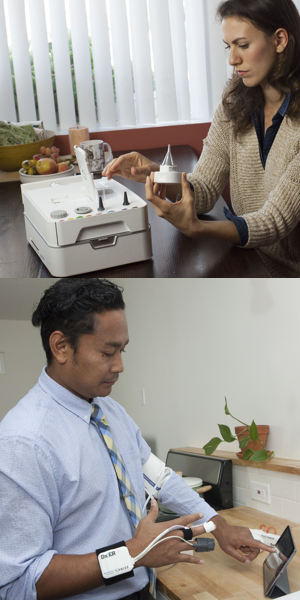 The Qualcomm Tricorder X Prize has narrowed its finalists down to two: Taiwan-based Dynamical Biomarkers and Paoli, Pennsylvania-based Final Frontier Medical Devices. The final phase of the contest will involve user testing at the Altman Clinical Translational Research Institute at the University of California San Diego.
The Qualcomm Tricorder X Prize has narrowed its finalists down to two: Taiwan-based Dynamical Biomarkers and Paoli, Pennsylvania-based Final Frontier Medical Devices. The final phase of the contest will involve user testing at the Altman Clinical Translational Research Institute at the University of California San Diego.
"It is an impressive achievement for these two teams to advance to the consumer testing stage of the competition with their devices,” Grant Campany, prize lead at the Qualcomm Tricorder X Prize, said in a statement. “This stage not only takes us one step closer to transforming sci-fi vision into a real-world impact, but more importantly, we are another important step closer to bringing a very user-friendly device to consumers around the globe, allowing them to proactively manage their own health in a way that has never been done before.”
The contest is a $10 million prize sponsored by Qualcomm and administered by the X Prize foundation, which organizes competitions to promote areas of innovation that, for one reason or another, the free market isn't nudging along fast enough. Qualcomm and X Prize licensed Star Trek IP from CBS and loosely timed the prize to line up with the 50th anniversary of the iconic sci-fi show. The prize is named for the tricorder, a medical scanning device used by the likes of Dr. McCoy and Dr. Crusher.
The goal is to build a real-life tricorder: a small handheld device that can accurately sense a large number of vitals signs and detect a number of diseases. The contest was originally announced at the end of 2012. Thirty-four teams entered the contest in 2013. By the beginning of this year, that total was down to seven.
DBG represents the Center for Dynamical Biomarkers and Translational Medicine, a Taiwanese research group founded in 2011 with a grant from the country's National Science Council. The team is led by Chung-Kang Peng, a Harvard Medical School professor currently on leave to work with the National Central University in Taiwan.
Final Frontier, whose name is also a nod to Star Trek, is made up of two brothers: Basil Harris, an emergency room physician, and George Harris, a network engineer. The team was founded expressly for the competition. They've since founded a company called Basil Leaf Technologies.
DBG and Final Frontier made it through a process that defeated a number of more high profile competitors including crowdfunding sensation Scanadu and Aezon, a team made up of (at the time of entry) Johns Hopkins undergrads. Now they will go through a consumer testing phase where users will be trained by a clinical coordinator, then have 90 minutes with the device to run themselves through its battery of tests.
“Star Trek has inspired many engineers on a quest to improve the world by turning science fiction into reality," Qualcomm Executive Chairman Dr. Paul Jacobs said in a statement. "The Communicator preceded the smartphone, which has revolutionized our personal interactions, and provided instant access to knowledge and entertainment. Now, our healthcare will be improved through the hard work and ingenuity of the Qualcomm Tricorder X Prize teams who are bringing the devices to life. We congratulate these two finalists on their success to date and wish them luck in the consumer testing phase.”
The winning team will receive $6 million and the runner up will get $2 million, with an extra million going to the team that records the most accurate vital signs in the final round. The final million of the prize was already given out to various teams in milestone prizes throughout the competition.




















